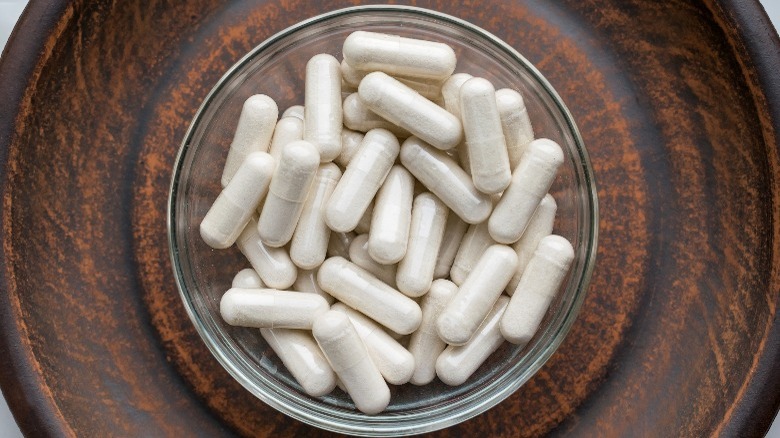These Herbs Could Be Risky For Your Liver
Americans love their herbal remedies. According to a press release distributed by Globe Newswire, the herbal supplements market in the U.S. was estimated at roughly $2.9 billion in 2020. However, if you're one of the people who include herbal supplements as part of your diet, health experts warn that there are certain herbs you should probably avoid, especially the ones that can cause injury to your liver.
An essential organ and the largest solid organ in the body, the liver serves hundreds of functions. Among the most notable are filtering the body's blood and producing bile, a digestive fluid that helps to remove waste products and toxins from the body. The liver also helps with regulating blood clotting, protecting against infection, and serves as a storage house for large quantities of vitamins and minerals, including vitamins A, D, E, K, and B12, along with iron and copper (via Columbia Surgery).
Considering how vital the liver is to supporting your health, it is important to be aware of which herbal supplements you are taking that may be putting your liver at risk, especially as the industry remains unregulated and rarely subject to government oversight (via Harvard T.H. Chan School of Public Health).
Herbs to watch out for
Given the popularity of herbal supplements along with the potential for some of them to do harm, it's no wonder that the journal Toxics reported in 2018 that herb-induced liver damage is on the rise.
"Herbal teas and supplements can definitively lead to liver injury and even liver failure," Tatyana Kushner, M.D., a hepatologist and an assistant professor in the division of liver diseases at the Icahn School of Medicine at Mount Sinai in New York City, tells Everyday Health. "Depending on the herb, the impact can be acute — and self-resolve — or can develop into chronic liver disease and liver failure, which would necessitate a liver transplant," Dr. Kushner says.
According to the experts at WebMD, some of the herbs to avoid include aloe vera, black cohosh, cascara, chaparral, comfrey, ephedra, and kava. Everyday Health also advises against consuming St. John's wort — or any other dietary supplement for that matter — if you are on prescription medication. This is because these herbs can cause liver problems including toxic hepatitis — an inflammation of the liver — which can then potentially lead to permanent damage and life-threatening circumstances. Symptoms of toxic hepatitis can include jaundice, pain in the upper portion of the abdomen, fever, and nausea or vomiting, among others (via Mayo Clinic).
Health experts recommend changing your lifestyle to include regular exercise and a healthier diet rather than relying on supplements, but if you still want to take herbal supplements as a complement, you should limit your consumption and become informed about the risks. "People should talk about herbal remedies with their doctor prior to starting, particularly if they are not familiar with the components of the herbal remedy," Dr. Kushner advises.


